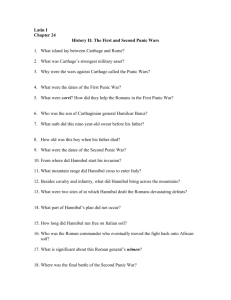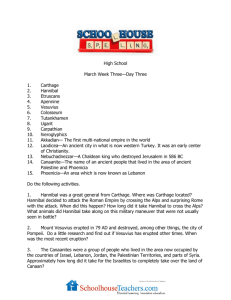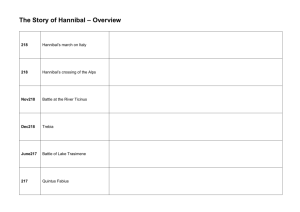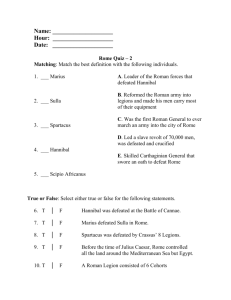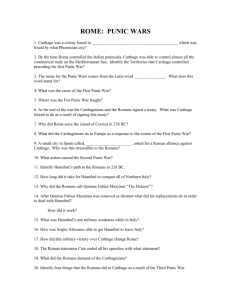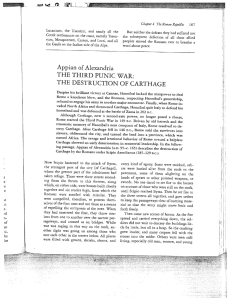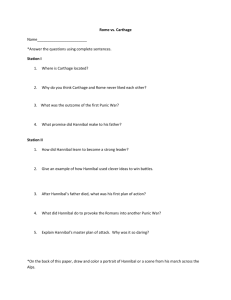Punic wars cloze
advertisement
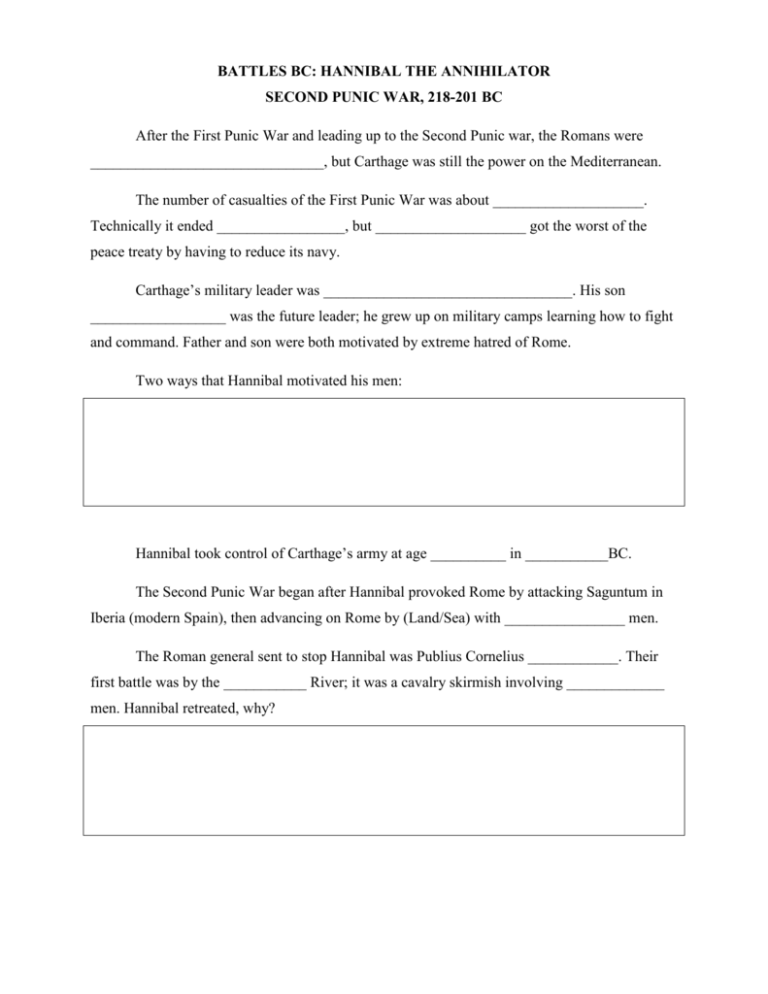
BATTLES BC: HANNIBAL THE ANNIHILATOR SECOND PUNIC WAR, 218-201 BC After the First Punic War and leading up to the Second Punic war, the Romans were _______________________________, but Carthage was still the power on the Mediterranean. The number of casualties of the First Punic War was about ____________________. Technically it ended _________________, but ____________________ got the worst of the peace treaty by having to reduce its navy. Carthage’s military leader was _________________________________. His son __________________ was the future leader; he grew up on military camps learning how to fight and command. Father and son were both motivated by extreme hatred of Rome. Two ways that Hannibal motivated his men: Hannibal took control of Carthage’s army at age __________ in ___________BC. The Second Punic War began after Hannibal provoked Rome by attacking Saguntum in Iberia (modern Spain), then advancing on Rome by (Land/Sea) with ________________ men. The Roman general sent to stop Hannibal was Publius Cornelius ____________. Their first battle was by the ___________ River; it was a cavalry skirmish involving _____________ men. Hannibal retreated, why? Hannibal chose to enter Rome by going ___________________________. He was faced with death by nature as well as tribes of ________________. At the other side of the mountains, Hannibal had lost __________ of his army. How did he replenish it? The next time that the Roman and Carthaginian armies met, each was roughly _________________ strong. Carthage’s is mostly made up of _____________________, while the Romans were disciplined and uniform. Their main advantage over enemies was: The Battle at Ticinus River, 218 BC: _________________ lost; _________________ was wounded. Battle at Trebia River, 218 BC: wintery and cold, the battle was won by __________________ because of smart commanding and use of forces. _________________ soldiers out of __________________ died. Hannibal lost all of his elephants but one. In 217 BC, Rome raised ___________________ more soldiers and sent two new consuls to hunt Hannibal: Geminus and Flaminius. The consuls divided, and what happened? At Lake __________________ in 217 BC, Hannibal set up an ambush for the Roman army pursuing him. He bet that they would follow his trap to be slaughtered. _____________________ men, including ____________________ died. Hannibal’s side lost ________________ men. This made ______ victories for Hannibal in ________ years. Rome named a ____________________, a rare desperate measure. His name was Quintus Fabius Maximus. He raised an army of ________________________. His strategy, called the Fabian Strategy, was: It would have worked, but the Senate was impatient. After 6 months, they elected new consuls to share command. Battle of Cannae, 215 BC: Rome had __________________ soldiers and ______________ cavalry to Hannibal’s _________________ soldiers. Both generals use new tactics, but one was much more successful. The first success in the battle was by _________________’s cavalry. Hannibal’s strategy to compress the Roman army then worked, eliminating their numbers advantage. In a single day, in a battle of ___________________, ____________________ Romans were killed. It was still impossible for Hannibal to invade Rome, why? END OF SECOND PUNIC WAR - - Rome went back to using the Fabian strategy of outlasting Hannibal. While the Carthaginians were still attacking around Italy for over a decade, they took back all of the Major Italian cities that had joined Hannibal and regained strength. The Romans sent armies to the Iberian Peninsula. Why did this hurt the Carthaginians with Hannibal in Italy? - - - The Roman armies, led by Publius Cornelius Scipio Africanus, ended Carthaginian control in Iberia in 206 BC by forcing Hannibal’s brother Hamilcar to retreat back to join the Carthaginian army in Italy. Scipio Africanus used his popularity after success to raise an army to invade Africa. Carthage had two options: Hannibal did return, but initially tried to negotiate peace. Negotiations failed and the decisive Battle of Zama near the city of Carthage followed in 202 BC. Hannibal: ________________ infantry, ___________ cavalry, ________ elephants. Scipio: __________________ infantry, ___________ cavalry (mostly Numidian) THIRD PUNIC WAR 144-146 - Carthage had to pay ________________ every year for _______ years. They also needed Roman permission to declare war, and Rome decided any border disputes between Carthage and Numidia. - In 151 BC, the 50 years were up and payments stopped. Carthage considered the treaty over. Rome did not – they intended the war and border clauses to be permanent. - Why was Carthage now expendable to Rome? - Rome used a small infraction by Carthage defending itself to make petty demands. They eventually refused and Rome began a siege. The siege lasted from ______ to ______ BC. - Many Carthaginians died of starvation or in the final attacks. All _______________ surviving citizens were sold into slavery. Rome annexed the area for _______________ and burned the city to the ground.
